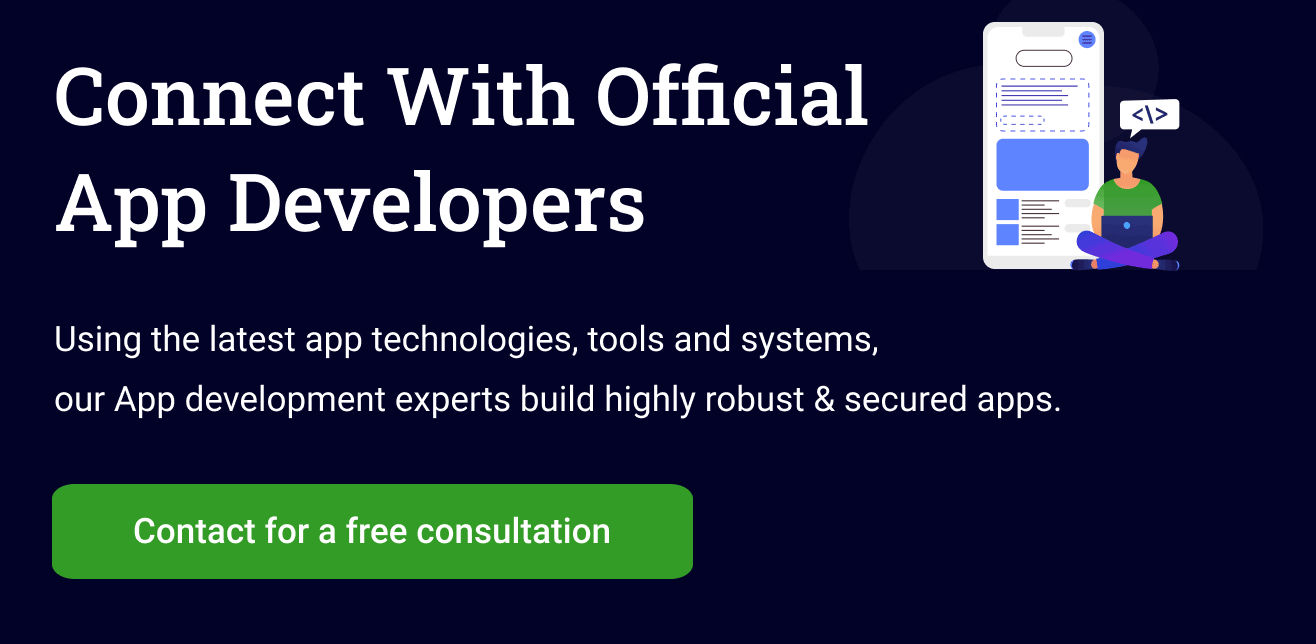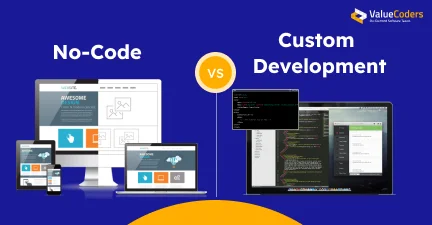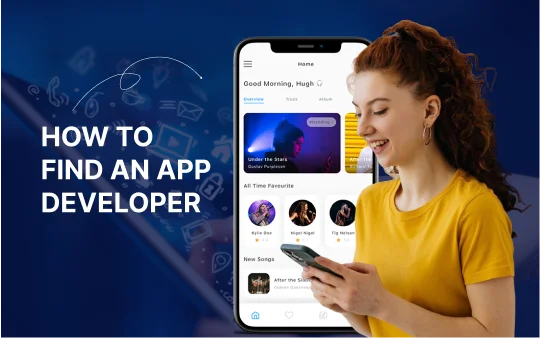Cross-platform app development is a massive trend in the software industry. More and more companies are looking to create applications that can run on multiple platforms without writing them from scratch. Several options are available for cross-platform app development, but Kotlin Multiplatform is quickly becoming the most popular one.
Kotlin Multiplatform is a toolkit that allows developers to write code that can run on multiple platforms. It supports all the major platforms, including iOS, Android, Windows, and Linux.
This blog post will discuss why Kotlin Multiplatform is the best option for cross-platform app development and how you can get started using it!
So let’s get started!
Why Use it?
There are numerous benefits to using Kotlin for cross-platform app development; we listed some of them below:
Native Interoperability
You can use any native library from any platform, as long as it’s available on the JVM. You can mix and match libraries from different platforms (e.g., Objective-C and Java) without overhead or cost.
For example, an Android developer can use a powerful iOS SDK like ARKit without understanding new programming languages or frameworks. Kotlin also makes it possible to work with JavaScript libraries like ReactJS and NodeJS by running code through a JavaScript engine, such as Nashorn.
Code Sharing
Your team only needs to maintain one project that runs everywhere, and all developers can share their code across platforms. You have complete freedom over what you want to write in your code.
All you need is Java 8, JavaScript, Swift 3, or Objective-C knowledge, which means less effort for understanding new syntaxes and language features when working with Kotlin.
No UI Required
One significant difference between Kotlin and other multiplatform solutions is that you don’t need to create a user interface for each platform. Since most mobile applications require touch input, we must recreate the UI from scratch for each device.
However, this problem goes away with Kotlin because you can create an app with no user interface! It’s much easier to deal with just one codebase than juggling multiple projects so that they can run on different devices.
Kotlin is Modern
Developing apps for multiple platforms has never been more challenging. Language requirements and platform fragmentation make it necessary to know many programming languages and spend valuable time maintaining separate codebases.
With Kotlin, you get the best of both worlds — you can use all the latest language features while still having access to older APIs and technologies. If you care about developing great apps quickly and easily, then Kotlin is the right choice for you!
Are you focusing on multiplatform app development? Hire dedicated kotlin app developers; by doing so, you will develop a leading business-centric multiplatform within no time.
You May Find This Interesting: Guide to Android App Development: Tips, Tricks, and Strategies for Building Successful Apps
Kotlin Multiplatform Increasing Popularity
How Does It Work?
The idea here was simple-if you can compile kotlin; it’s usable within Android environments, then why don’t we take advantage? The Jetbrains team behind this proposal started thinking about what might happen if their efforts were successful enough to bring such an accomplishment across both platforms: one being CVDoM (i Phone) & another LM.
Jetbrains has been working on the possibility that Kotlin could also be compiled for iOS. This way, we would have 100% native code without wrappers or web pages; everything is integrated into the system, and there are no barriers when connecting with specific features of each platform.
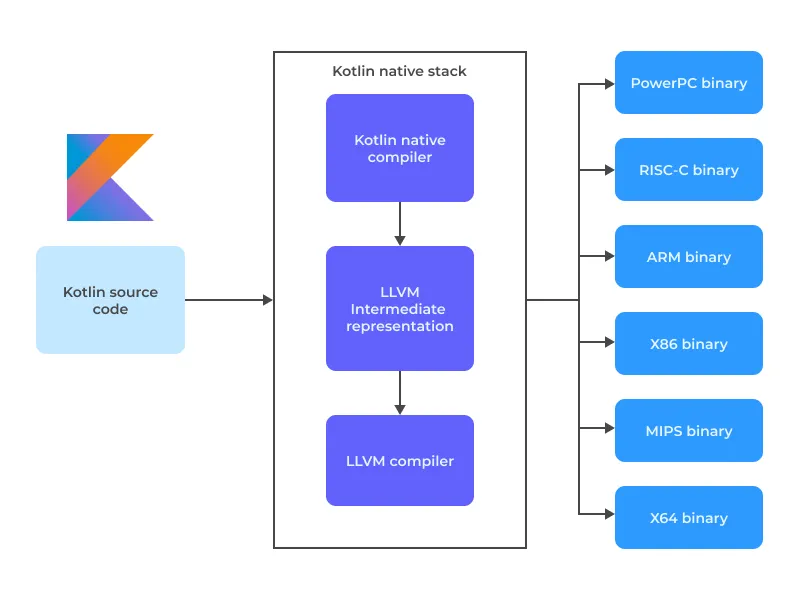
What Does This Diagram Mean?
It means that Kotlin source code is assembled directly for each architecture. The Kotlin compiler utilizes LLVM to decode the Kotlin code into a native one, with just the instruction set required for the substantial architecture, for example, iOS x64 ARM.
This practice has an inconvenience that could be deemed a disadvantage: we will still have to create the UI layer twice.
Although it may be considered a disadvantage because of the extra cost, in some circumstances, it could be a benefit, as you can create a slightly distinct UI for each platform giving the user an experience near to the typical usage of each platform. As we will see in the “What is coming next” section, there is a new alternative to develop the UI (Jetpack Compose) that could alleviate this inconvenience.
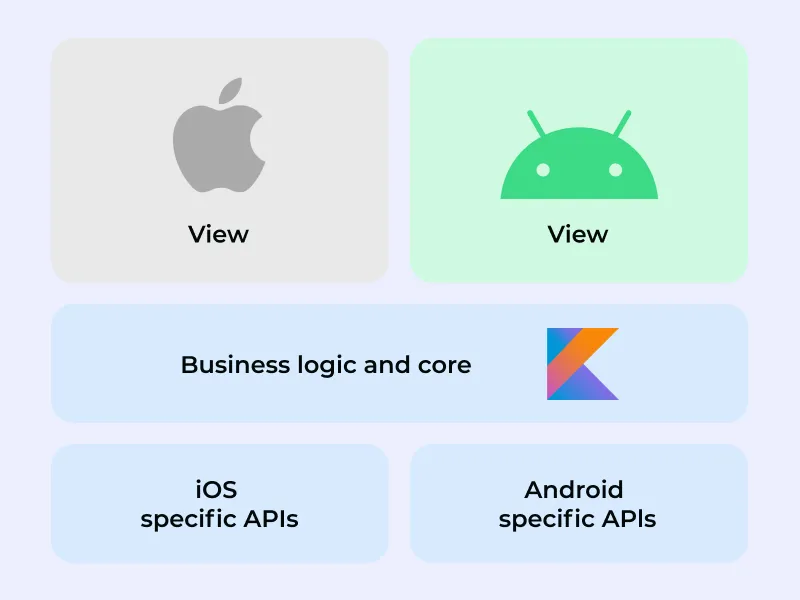
We can use this approach to develop the common parts of our libraries or modules. In Android’s case, generate an aar/jar file you can include in your project. If it applies to iOS, too, there is no need to worry about managing frameworks because they will be made available through Swift Package Manager or Cocoapods.
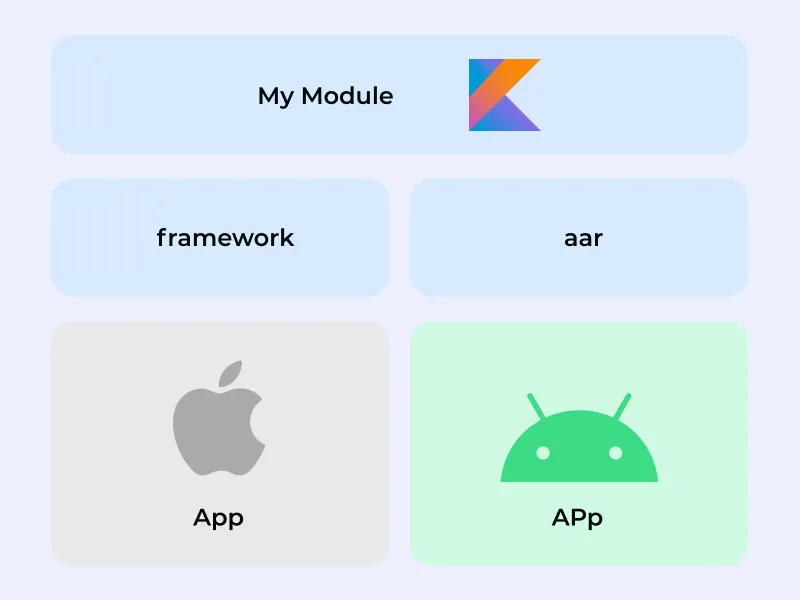
With this approach, the compiler will forge the library with only the associated code, which means that in the case of iOS, the .framework will contain the shared code and the platform-specific code (iOS code written in Kotlin).
The native UI layer will use libraries or module sayer being a native library. There is no restriction on how to use them, so they could operate them from a plugin for Flutter, a connector for Xamarin, React Native, or even link it with a Cordova web plugin. Although technically possible, there is not much business benefit to using such combinations.
You can hire Kotlin developers if you want to create a multifunctional application for your business verticals.
Also Read: Incredible Kotlin Features Reiterating Android App Development Processes
Kotlin Multiplatform: Why It Is Better Than Other Cross-Platform Tool
In the past few years, there has been a shift in the mobile app development landscape. With the rise of cross-platform app development tools, developers are no longer limited to developing for a single platform.
Kotlin Multiplatform is one of the most popular cross-platform app development tools. Here are seven reasons why it’s better than other cross-platform tools:
* It’s simpler and more intuitive than Java or C++, which means we spend less time learning the basics. And because it integrates with JavaScript frameworks like React Native and AngularJS2, you don’t have to learn JavaScript if you don’t want to!
* It doesn’t require codebase modifications when making apps on different platforms, so maintenance costs are lower and deployment times are shorter.
When using Kotlin Multiplatform, you can share data between Android and iOS apps without using third-party plugins or libraries!
* You can use your favorite IDE, like Android Studio or Xcode, with it and all your favorite libraries without having to change anything about your workflow!
* Kotlin Multiplatform makes creating multiplatform apps for the three major operating systems easy, making your potential customer base more extensive.
* Although some exceptions exist, programming languages usually run at comparable speeds. However, Kotlin Multiplatform requires much less effort to achieve native performance because it compiles machine code instead of an intermediate language.
* Even though it was developed by JetBrains — the company behind IntelliJ IDEA — Kotlin Multiplatform is entirely open-source under Apache 2 license, so you don’t need to worry about proprietary permits and licensing fees!
* One last thing that sets Kotlin Multiplatform apart from other cross-platform solutions is that it does not rely on browser rendering engines (although this might be a downside for some).
Instead, this tool creates software applications that act and feel like native apps running directly on the device with full access to sensors and hardware features.
To Build Feature-rich, Interctive & Secure Android Apps.
Famous Brands Using Kotlin Multiplatform
There are so many small to big brands using Kotlin Multiplatform that it’s impossible to list them all. But here are a few examples of well-known companies using the technology.
Google: Google, an American multinational technology company, has invested heavily in Kotlin. With its Android Studio IDE, built on top of IntelliJ IDEA, it allows you to develop Android apps; there is a high probability you have already come across this language while developing your Android app.
Netflix: One of the leading video streaming services uses Kotlin as its primary development language. A spokesperson from Netflix confirmed their use of Kotlin for production code, stating that it offers us the best balance between ease of use and performance.
Pinterest: Pinterest is one of the most popular social media platforms. They also used Kotlin and explained their choice by saying they need a programming language they can count on — one that will be reliable, performant, scalable, and good at what it does. We think we found what we were looking for in Kotlin.
Uber: An online transportation network company headquartered in San Francisco also relies on Kotlin Multiplatform to develop its software products. Its CTO affirmed the use of Kotlin in his interview with InfoWorld magazine, where he claimed that one of the major advantages was cross-platform availability.
Must Read: Top 7 Kotlin App Development Companies To Make Android App – A Real Bonanza
Conclusion
Kotlin multiplatform is a great choice for businesses because it offers an efficient and concise way to develop cross-platform applications. We have designed the language with business needs in mind, so you can be sure that your app will meet all the requirements with no nasty surprises.
In addition, Kotlin multiplatform use Java libraries, which give you access to a vast pool of existing code snippets and modules that can help you quickly get your project off the ground.
If you’re looking for a reliable and efficient cross-platform app development tool, Kotlin multiplatform should be at the top of your list.
If you have tried using Kotlin for your next project, hire developers in India from a trustworthy Kotlin app development company (ValueCoders). With over 500 developers, you can hire them to get your work done on time.
Frequently Asked Questions
Why prefer Kotlin for android app development?
There are a few reasons Kotlin is gaining popularity among Android app developers.
First, Kotlin is statically typed, which catches errors and potential bugs in your code as you write it.
Second, Kotlin is interoperable with Java. You can use Java libraries in your Kotlin code and vice versa. If you’re already familiar with Java, learning Kotlin will be a breeze.
Finally, the Android development community has firmly embraced Kotlin. You’ll find plenty of online resources, tutorials, and support forums to help you get started with Kotlin programming.
What are the main features of Kotlin Multiplatform?
Kotlin Multiplatform is a relatively new feature that was introduced in Kotlin 1.3. It allows you to share code between platforms (such as Android and iOS) without having to write it twice.
Kotlin Multiplatform also offers several other features, such as:
– Cross-platform libraries
– Platform-specific libraries
– Multiplatform projects
– Shared projects
What are the benefits of using Kotlin Multiplatform?
The benefits of using Kotlin Multiplatform are:
– You can write your code once and compile it into binaries for all supported platforms
– You can create separate projects for each platform and share common code
– You can use the same IDE and build tools for all your projects
– You can use the same libraries for all your projects
What are the drawbacks of using Kotlin Multiplatform?
Kotlin Multiplatform is still developing and is not yet ready for production use. This means that there may be some bugs and limitations. Kotlin Multiplatform also works with JVM, JavaScript, and native code. It does not work with other languages such as Swift or Objective-C.


